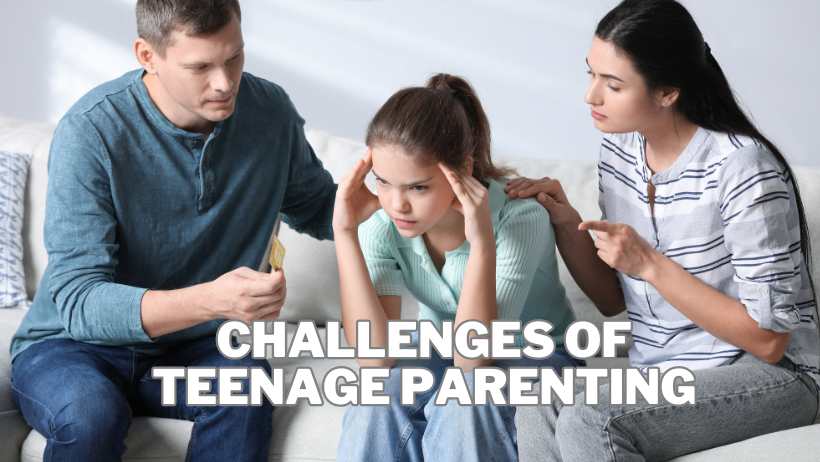
The Challenges of Teenage Parenting: Explore the problems faced by teenage parents and their children. From emotional challenges to financial difficulties, education challenges to social stigma, this article sheds light on the unique problems of teenage parenthood. Gain insight and understanding into this complex world.
Imagine being a teenager and suddenly finding yourself responsible for another human life, navigating the challenges of parenthood while still trying to figure out who you are. The journey of teenage parenting is anything but easy, as both the young parents and their children face numerous obstacles along the way.
This article delves into the complex world of teenage parenting, shedding light on the struggles, hardships, and unique problems experienced by both the teenage parents and their children. From financial difficulties to emotional challenges, this article explores the multifaceted nature of teenage parenthood and seeks to offer insight and understanding to those who find themselves in this situation.
Emotional challenges faced by teenage parents
Being a teenage parent can bring about a whirlwind of emotions. One of the most common emotional challenges is the feeling of inadequacy and unpreparedness. Teenagers often feel overwhelmed by the responsibilities of becoming a parent at such a young age, which can lead to feelings of self-doubt and insecurity. They may fear that they are not equipped with the necessary skills and knowledge to adequately care for their child.
In addition to feeling inadequate, teenage parents often lack emotional support from their family and friends. They may face judgment and criticism, which further exacerbates their feelings of loneliness and isolation. The absence of a strong support system can make it difficult for them to cope with the emotional demands of parenting, leading to increased stress and anxiety.
Stress and anxiety are prevalent among teenage parents. The challenges of balancing school, work, and childcare responsibilities can take a toll on their mental wellbeing. They may struggle to manage their time effectively, causing feelings of overwhelm and burnout. The constant pressure to meet the needs of their child while navigating the complexities of teenage life can lead to elevated levels of stress and anxiety.
Depression and postpartum depression are also significant emotional challenges faced by teenage parents. The hormonal changes that occur during pregnancy and after childbirth can contribute to the development of depression.
Additionally, the stress and challenges of being a young parent can intensify feelings of sadness, hopelessness, and low self-esteem. Without proper support and intervention, these emotional difficulties can linger and impact the overall wellbeing of both the parent and the child.
Balancing parental and personal responsibilities is another emotional challenge for teenage parents. They may struggle to find the right balance between their role as a parent and their own identity and desires.
The demands of parenting can restrict their ability to pursue personal goals and aspirations, leading to feelings of frustration and resentment. It can be challenging for them to maintain a sense of self while meeting the needs of their child, creating a significant emotional burden.
Financial difficulties
Teenage parents often face significant financial difficulties that can exacerbate the already challenging task of parenting. Limited job opportunities and lower wages due to their young age and lack of work experience make it difficult for them to secure stable employment. This can lead to financial instability and increased stress.
The high cost of child-rearing is another financial challenge faced by teenage parents. From diapers to formula, childcare expenses to medical bills, the financial burden can quickly add up. Teenagers may struggle to provide the basic needs for their child, such as adequate nutrition, healthcare, and a safe living environment.
Education disruption and reduced earning potential are also significant financial challenges. The responsibilities of parenting often require teenagers to place their education on hold or limit their educational pursuits.
This can have long-term consequences, as it reduces their earning potential and limits their ability to provide for their child in the future. The cycle of poverty and financial struggle can be difficult to break without access to quality education and employment opportunities.
Dependency on public assistance is another financial challenge faced by teenage parents. Many rely on government programs such as welfare, food stamps, and Medicaid to support their growing family. While these programs provide much-needed assistance, they can also perpetuate a cycle of dependency and have long-term implications for their financial stability.
Struggling to provide basic needs for their child is a constant concern for teenage parents. From clothing to housing, the financial strain can make it difficult for them to meet the essential needs of their child. The stress of not being able to provide for their child’s basic necessities can significantly impact their emotional wellbeing and overall parenting experience.
Educational challenges for teenage parents
Education can be heavily impacted by teenage parenting. Dropout rates among teenage parents are significantly higher compared to their peers without children. The responsibility of raising a child often necessitates a shift in priorities, leading to decreased school attendance and engagement.
Managing school and childcare simultaneously poses significant challenges for teenage parents. The need to attend to their child’s needs may interfere with their ability to attend classes regularly or complete assignments on time. The juggling act of parenting responsibilities and educational pursuits can lead to increased stress and a sense of being overwhelmed.
Parental involvement in educational activities is crucial for a child’s success in school. However, teenage parents may struggle to find the time and resources to actively participate in their child’s education. This lack of involvement can have long-term consequences for their child’s educational outcomes.
Unsupportive school environments can also present challenges for teenage parents. The stigma and judgment surrounding teenage pregnancy can lead to negative attitudes from teachers and peers, making it difficult for them to feel supported. This lack of support can hinder their educational progress and contribute to feelings of isolation and insecurity.
Financial constraints associated with teenage parenting can limit access to quality education. Teenage parents may not have the resources to afford private schools or additional support services that could enhance their child’s educational experience. This lack of access to quality education can perpetuate the cycle of poverty and limit the opportunities available to both the parent and the child.
Social stigma and judgment
Teenage parents often face negative attitudes and social stigma from their communities. The judgment they encounter can exacerbate their emotional challenges and contribute to feelings of shame and inadequacy. Many face social exclusion and isolation as a result, leading to a sense of loneliness and a lack of support.
Peers, family members, and the broader community can contribute to the judgment experienced by teenage parents. Instead of offering understanding and empathy, they may blame and shame the young parents, making it difficult for them to feel accepted and supported.
This lack of understanding can hinder their ability to navigate their role as a parent and can have long-term consequences for both their mental health and the development of their child.
Lack of understanding and empathy can also lead to limited access to resources and support systems. Teenage parents may be hesitant to seek help due to fears of further judgment or stigma. This reluctance to access available support can intensify their feelings of isolation and make it challenging for them to find the assistance they need to thrive as parents.
Shaming and blame can negatively impact the self-esteem and confidence of teenage parents. Instead of being encouraged and supported, they may constantly question their abilities as parents. This emotional burden can hinder their overall wellbeing and make it challenging for them to develop healthy relationships with their child.
Lack of parenting skills and knowledge
Teenage parents often lack the necessary experience and exposure to childcare prior to becoming parents themselves. This limited experience can make it challenging for them to navigate the complexities of parenting, leading to a lack of confidence and uncertainty.
The absence of guidance and role models can further compound the challenges faced by teenage parents. Many do not have the support and guidance of older, more experienced parents to turn to for advice and assistance. This lack of guidance can hinder their ability to establish effective parenting techniques and can create a sense of confusion and insecurity. Mindfulness for Kids and Teens – Information and Tips for Parents
Inadequate knowledge about child development and parenting techniques can impact the overall well-being of the child. Teenage parents may struggle to understand the physical, emotional, and cognitive needs of their child, leading to difficulties in meeting those needs effectively. This lack of knowledge can hinder the healthy development of the child and contribute to the challenges faced by both the parent and the child.
Establishing discipline and boundaries can be particularly challenging for teenage parents. They may struggle to find the balance between being authoritative and being nurturing, leading to inconsistency and confusion in their parenting approach. This lack of consistent discipline can impact the child’s behavior and overall upbringing.
Fostering healthy parent-child relationships is another challenge faced by teenage parents. The emotional demands of parenting can strain their ability to form strong and nurturing bonds with their child. The lack of experience and limited access to resources can hinder their ability to develop the necessary skills to cultivate a healthy parent-child relationship. Harmony at Home: Cultivating Positive Communication in Family Conversations
Health and well-being concerns
Teenage parents, as well as their children, face higher health risks compared to older parents. The physical toll of childbirth and the demands of parenting at a young age can have long-term consequences for their health and well-being.
Inadequate prenatal care is a concern for teenage parents. They may lack the knowledge and resources to seek proper prenatal care, which can lead to complications during pregnancy. This lack of access to adequate healthcare can impact the health of both the parent and the child.
Limited knowledge about nutrition and healthy habits can contribute to adverse health outcomes for teenage parents and their children. Teenagers may not fully understand the importance of a balanced diet or the potential consequences of unhealthy behaviors. This lack of knowledge can increase the risk of health issues, both in the short-term and in the future.
The increased likelihood of substance abuse and risky behaviors is another health concern for teenage parents. They may turn to unhealthy coping mechanisms such as drugs or alcohol to manage the stress and emotional challenges of parenting. These risky behaviors can have detrimental effects on their own health as well as the development of their child. Mindfulness for Kids and Teens – Information and Tips for Parents
The impact of teenage parenting on future health and well-being is significant. The demands and stresses associated with parenting at such a young age can have long-lasting effects on their overall physical and mental health. The cycle of poor health and limited resources can persist into adulthood, creating challenges for both the parent and the child.
Relationship difficulties
Teenage parenting can strain romantic relationships. The added responsibilities and pressures can create tension and conflicts, leading to increased relationship stress. The lack of maturity and life experience among teenage parents can make it challenging for them to navigate the complexities of a romantic partnership.
The increased likelihood of separation or divorce is another relationship difficulty faced by teenage parents. The strain of parenting at a young age can lead to the breakdown of the relationship, as the demands and challenges become overwhelming. The lack of stability in their romantic relationship can further contribute to the emotional challenges faced by teenage parents.
Co-parenting and communication can be particularly challenging for young parents. Teenagers may struggle to effectively communicate their needs and concerns, leading to misunderstandings and conflicts. The absence of healthy communication can hinder their ability to co-parent effectively, creating further strain in their relationship.
Lack of support from partners or support systems can intensify the challenges faced by teenage parents. Teenagers may not have the necessary support from their romantic partner or their own families to navigate the demands of parenting. This lack of support can create a sense of isolation and make it even more challenging for them to effectively co-parent and maintain a healthy relationship.
Prioritizing relationship maintenance can be difficult for teenage parents. The overwhelming responsibilities of parenting can leave little time and energy for nurturing their romantic partnership. This lack of focus on their relationship can lead to increased distance and decreased satisfaction in their partnership.
Parental responsibilities and time management
Juggling parental responsibilities with other personal obligations can be a significant challenge for teenage parents. The demands of taking care of a child can make it difficult for them to allocate time to other areas of their life, such as education, work, and personal relationships.
Limited personal time and self-care are common challenges faced by teenage parents. The constant demands of parenting can leave little time for self-care and personal pursuits. Teenagers may struggle to find time for themselves, leading to increased stress and a sense of being overwhelmed.
Finding suitable childcare can also pose difficulties for teenage parents. They may lack the financial resources to afford quality childcare services or face limited options due to their young age. This lack of access to reliable childcare can make it challenging for them to attend school or work consistently, further complicating their ability to balance their responsibilities.
Maintaining a work-life balance is another challenge for teenage parents. They may have to work to support their child financially, but the demands of their job can interfere with their ability to meet the needs of their child. The constant juggling of work and parenting responsibilities can create stress and strain on their overall well-being.
The impact of teenage parenting on future aspirations and goals is significant. Teenagers often have to put their dreams and aspirations on hold in order to prioritize their role as a parent. This delay in pursuing their goals can have long-term consequences for their personal and professional development.
Multigenerational parenting challenges
In some cases, grandparents may step in to take on the parenting role for teenage parents. This multigenerational parenting dynamic can present its own set of challenges and complexities.
Generational gaps and differences in parenting styles can pose challenges for multigenerational families. The grandparents may have different beliefs and approaches to parenting compared to the teenage parents. This can lead to conflicts and disagreements regarding how the child should be raised.
Stress and strain on family dynamics are inevitable in multigenerational parenting situations. The added responsibilities and complexities of raising a child at a young age can put a strain on family relationships. The grandparents may feel overwhelmed by the responsibilities of parenting again, while the teenage parents may feel judged or criticized by their own parents.
Financial and emotional burdens on grandparents are also significant challenges. Taking on the role of a parent later in life can have financial implications for the grandparents. They may need to provide financial support for the child, which can strain their own resources. Additionally, the emotional toll of parenting at an older age can impact their own health and well-being.
The impact on the development of both teenage parents and their children is another challenge. The absence of the teenage parents in the parenting role can limit their own personal growth and development. Additionally, the child may face challenges in forming a strong bond with their teenage parents and may miss out on the opportunity to develop a nurturing relationship with them.
Limited access to support and resources
Teenage parents often face limited access to comprehensive sex education. The lack of information and knowledge about reproductive health and contraception can contribute to unplanned pregnancies. Without proper education and awareness, teenagers are more likely to engage in risky sexual behaviors, increasing the chances of becoming a parent at a young age.
Limited availability of parenting programs specifically tailored for teenage parents is another challenge. Teenagers may not have access to programs that can provide them with the necessary knowledge and skills to navigate the complexities of parenting. This lack of support can hinder their ability to develop effective parenting techniques and can contribute to the challenges they face.
Stigma associated with seeking help can make it difficult for teenage parents to access the support and resources available to them. The fear of judgment and discrimination can prevent them from seeking assistance when they need it most. This lack of access to support can exacerbate the emotional and financial challenges they face, and hinder their overall well-being.
Limited access to healthcare and mental health services is another challenge for teenage parents. They may struggle to afford medical check-ups and appropriate healthcare for themselves and their child. Additionally, they may not have access to mental health services that can provide the necessary support and intervention for their emotional well-being.
Lack of awareness about available support systems can make it difficult for teenage parents to seek the help they need. Many are unaware of the resources and programs available to assist them in their parenting journey. This lack of awareness further compounds the challenges they face and makes it harder for them to overcome the obstacles associated with teenage parenting.
In conclusion, teenage parenting comes with a multitude of challenges that span across various aspects of life. Emotional difficulties, financial struggles, educational challenges, social stigma and judgment, parenting skills and knowledge, health concerns, relationship strains, time management issues, multigenerational parenting dynamics, and limited access to support and resources all contribute to the unique struggles faced by teenage parents.
Understanding these challenges and providing comprehensive support and resources is essential in helping teenage parents navigate their role and ensure the well-being of both themselves and their children.


















